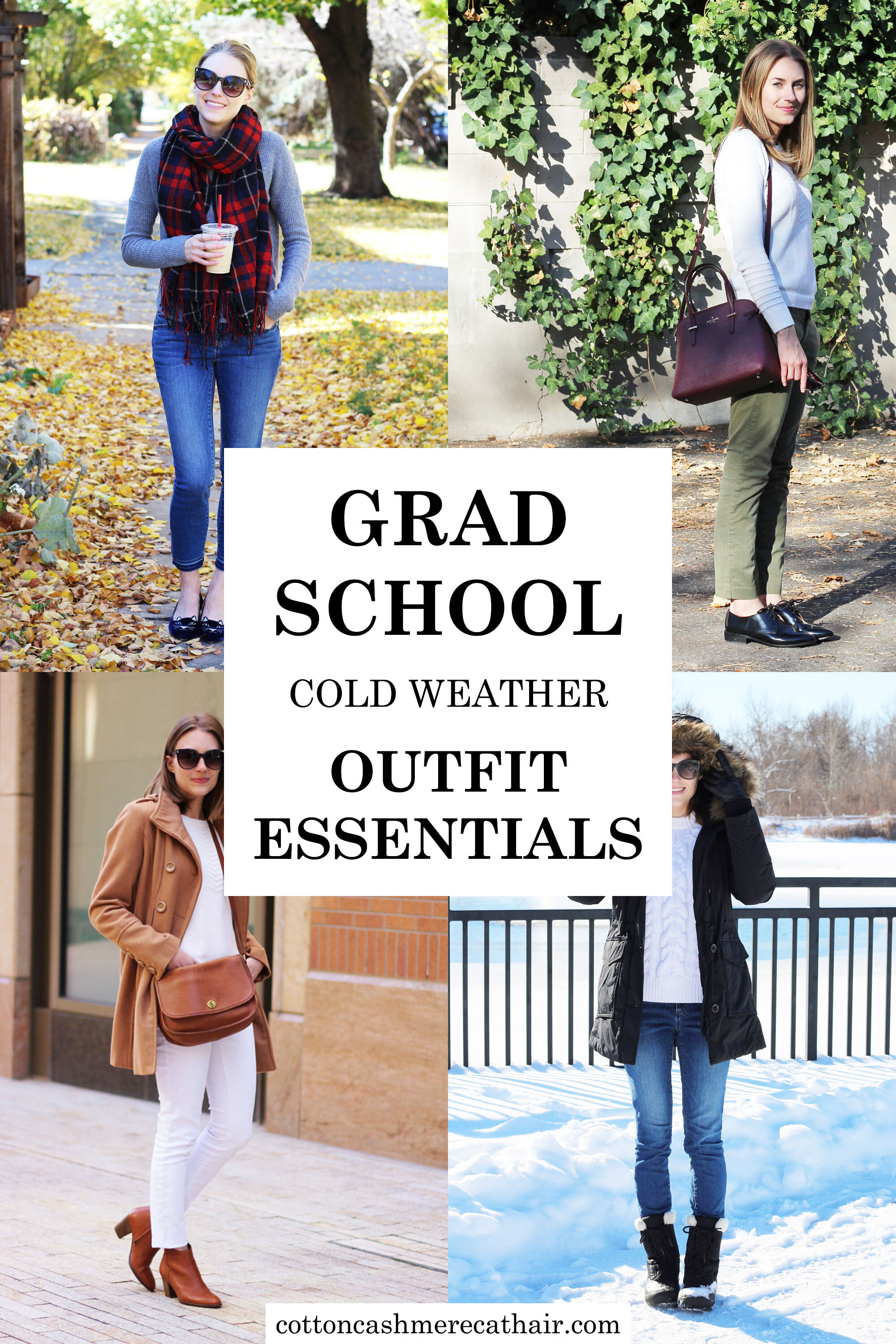Grad School Cold Weather Outfit Essentials
As a companion to my blog post about how to update your wardrobe for grad school, I rounded up a list of cold weather wardrobe essentials I recommend to kickstart your wardrobe if you’re looking to add anything new for grad school or make any updates to your current wardrobe from undergrad!
Read next: Grad school warm weather outfit essentials
These are my recommendations based on my own grad school journey, and you may find that you prefer to wear items that I don’t mention here. My goal is to guide you when making your wardrobe purchasing decisions based on the grad school activities you’ll be partaking in: researching/writing, teaching, field work, lab work, and (virtual) presentations, conferences, and interviews!
The number one and best thing to remember is that, for the most part, you can wear whatever the hell you want to wear in grad school. 🙌🏻 Whoop! Also, comfort is key, and well-fitting clothes will do wonders for your confidence!
This roundup is perfect for those of you living in a climate that has distinct seasons and for those of you that live in a cooler climate year-round. I hope this post helps you figure out where you might have holes in your cold weather wardrobe and where you might want to prioritize your purchases, because I remember that grad school budget life all too well. Let me know if you have any specific questions in the comments!
NOTE: The biggest difference between dressing for warm weather and dressing for cold comes down to outerwear and footwear. I highly recommend purchasing at least one coat (of appropriate weight for your climate) that can carry you through winter and at least one pair of all-weather boots that you can wear commuting through rain, snow, slush, etc. if you don’t already have these!
Grad school cOLD weather outfit essentials
Researching/Writing
In grad school, especially as you near the end of your program and are preparing your thesis or dissertation, you’ll be spending a lot of time on the computer doing research and writing literature reviews, writing journal articles and chapters in your thesis or dissertation (for me, my journal articles became chapters), and editing/formatting (because of course it’s on the grad students to follow the nit-picky formatting guidelines of the university…but that’s a rant for another day).
If you’re like me, you’ll also be spending a ton of time learning how to code (read: googling every. little. function.) and running computer models. Because I did not teach or do any lab or field work, I spent all of my time outside class at my computer, so this is the area I know most about, and my own personal grad school wardrobe essentials fit almost entirely into this section!
P.S. It might seem silly, but I highly recommend keeping a blanket with sleeves at your desk. You’ll thank me later! 😉
OUTFIT ESSENTIALS
Layers, layers, and more layers (cardigans, blazers, vests)
Sweatshirts
Basic/graphic tees
Elastic waist skirts (in a long length/warm fabric)
Stretchy pants/jeans
Sneakers/boots
Desk slippers/cozy socks
Rain jacket/puffer coat for commuting
Teaching
Many grad students will spend their time TAing or teaching lower level courses in addition to attending class and researching/writing. Even though I was not a TA and did not teach, I listed some items that I’ve seen professors wear to teach, and I considered what I would want to wear myself. Teaching requires garments that you can move in easily and be comfortable all day long, and you also want to dress in a way such that you do not look like a student—especially if you’re a petite woman like me. A lot of what you likely already own for researching/writing and any conference attire would work for teaching, too!
OUTFIT ESSENTIALS
Cardigans/blazers
Sweaters
Tailored tops (with long sleeves)
Button-down shirts
Knee-length/midi skirts/dresses in a warm material
Ponte/work pants
Dark wash/black denim
Comfortable flats/loafers/boots
Fun jewelry
Tote bag
Field Work
Some grad school programs and research projects require field work, where you’ll be out taking samples or measurements and may be doing a bit of hiking or otherwise outdoorsy activities in the elements. (On the flip side, you might also do field work that doesn’t require outdoor gear!) You’ll want to have a few items in your wardrobe that can get dirty and work for any weather you may encounter, especially if you’ll be out in the snow (bonus: you can reuse all of these items on your own fun outdoor adventures!).
OUTFIT ESSENTIALS
Water and windproof coats and jackets
Thermal layers (including pants!)
Fleece jackets
Long, thick pants/leggings
Wool socks
Hiking boots with traction/spike attachment for ice
Wide-brimmed hats (still need sun protection!)
Sunglasses
Backpacks
Other outdoor gear such as snow shoes
In the Lab
When I was an undergrad, I worked for a grad student running water samples in a lab over one summer. I didn’t handle any hazardous materials, so I actually don’t remember there being a specific dress code ha! I want to say I just wore normal, casual summer attire, but I don’t have any photos to confirm and my memory is a little fuzzy. Still, if you know you’ll be in a lab environment regularly, closed toe shoes are a must! I also recommend lightweight layers to keep warm in case the A/C is blasting or the room is intentionally kept cold, but avoid wide/loose sleeves or anything that could get caught or drop into things.
OUTFIT ESSENTIALS
Cardigans/sweaters with slim-fit sleeves
Basic/graphic tees and/or thin sweaters to layer under cardigans
Comfortable full-length pants/jeans
Closed toe shoes (flats/sneakers/boots)
(Virtual) Presentations/Conferences/Interviews
A major component of grad school is presenting your research, attending and participating in conferences, networking, and interviewing for grad school programs as well as future post-grad positions. Most of that is still taking place virtually as of now, but even if you are doing only virtual events, there are still some outfit essentials I would recommend! The key to dressing to present yourself and/or your research is to wear what makes you feel most confident and put together. And you absolutely DO belong in these spaces—don’t let impostor syndrome bring you down!
OUTFIT ESSENTIALS
Blazers—structured wool or sweater
Sweaters
Tailored tops (with long sleeves)
Button-down shirts
Knee-length/midi skirts/dresses in a warm material
Tights (opaque regular tights/sweater tights)
Ponte/work pants
Dark wash/black denim
Comfortable and neutral flats/heels/boots
Statement jewelry
Wool coat (and/or puffer if you’re in the sciences like me, lol)
Tote bag
INEXPENSIVE BRANDS TO SHOP FOR GRAD SCHOOL FASHION
If you’re looking to do a bit of shopping, I highly recommend checking out this list of brands to start; you’ll be able to find almost everything you need, and most of them offer fabulous sales to boot (and don’t forget to use your student discount if it’s available!):
Of course, this list is not exhaustive! You’ll be able to find what you need wherever you love to shop. I recommend keeping a list/note on your phone of what you’re looking to add to your wardrobe (with specifics!) so you can stay focused and on budget when shopping. This list comes especially in handy if/when you stop at a thrift store and/or search secondhand listings online!
What are your cold weather outfit essentials for each of these grad school-related activities? Let me know if I missed anything important!
Interested in more grad school content? Check out my advice for prospective students, how to dress confidently for grad school, what to wear at an academic conference, and a list of careers in science outside academia.

